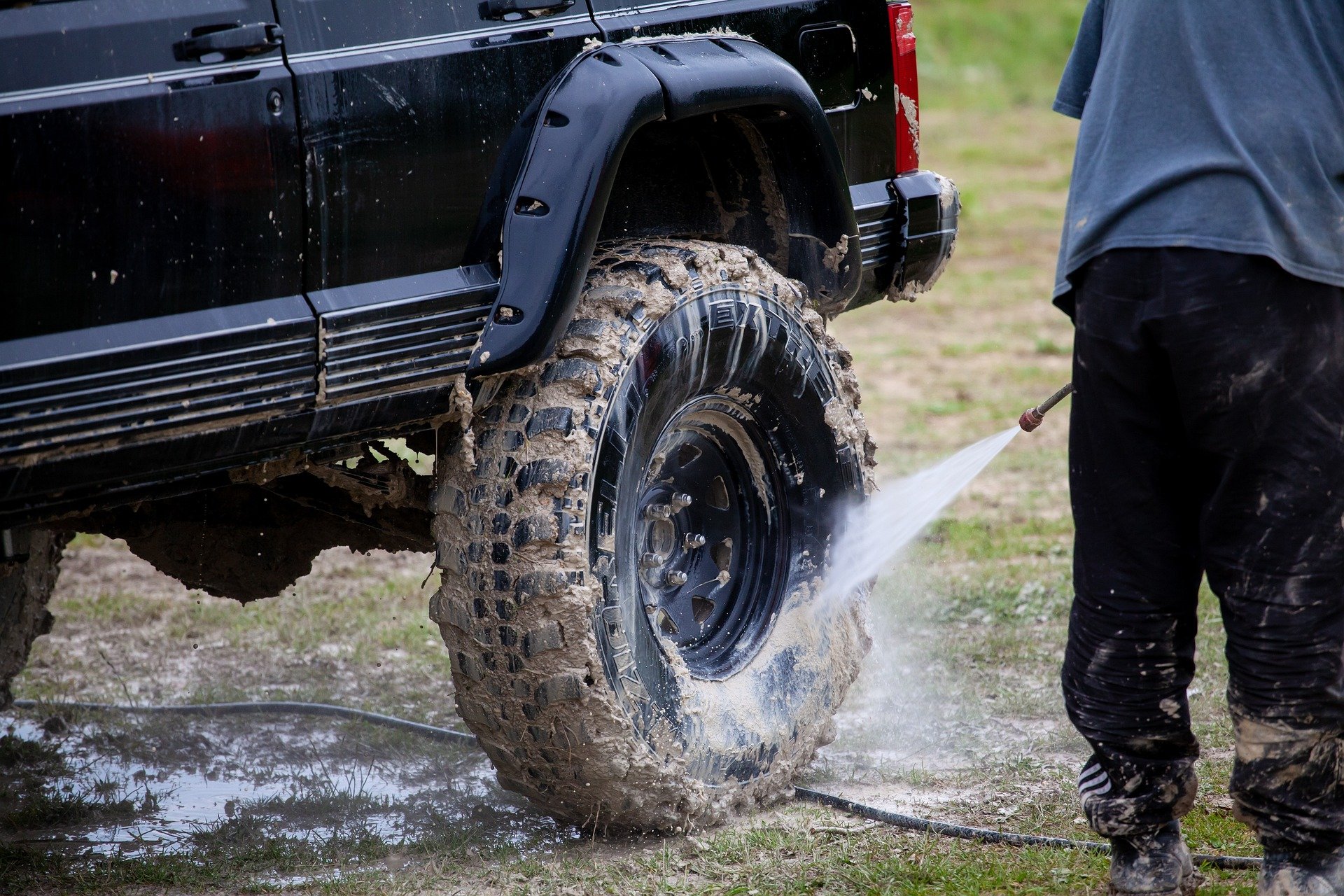Confession time, in many of our metal garden furniture cleaning and maintenance articles we will say that you do NOT need to use a pressure washer and that a bucket of warm soapy water to wash and a garden hose on the spray setting to rinse will suffice.
That statement is true. It is our go-to method. However, that does not mean you can’t use a pressure washer to clean our garden furniture. The powder-coated finish is tough and durable much like a car. That said, there will be a few words of caution in this article. Yes, you can use them but you must be careful!
Also, our cast aluminium metal furniture, whilst it will get dirty when left outside, it is rare that it will get so dirty that it needs to be jet washed. Warm soapy water may not be as quick but it is certainly more convenient (and effective) than getting the pressure washer out, setting it up, and then putting it back away again.
Other materials, such as softwoods and plastics, for example, should NOT be cleaned with a pressure washer. That said, at the end of the day the call is yours to make, but it can be risky. The high pressure can easily damage or gouge the softer surface. Softwoods like pine, cedar, fir, and spruce are much more susceptible to damage from pressure washing too, due to their more porous woodgrain.
However, if the wood is weathered and in need of repair and refinishing, then a pressure washer can be a good tool to start the strip and prep process. With a little caution, they are an effective way of removing any existing finishes or stains such as mould and mildew from the surface. However, again, caution is advised.
In this article, we want to look at this area a little closer to see what a pressure washer is good for and if it is safe to clean our garden furniture with one.
Should you purchase a pressure washer?
Pressure washers start at around the £100 mark but you do tend to get what you pay for. The cheaper ones come with very little in the way of functionality and accessories such as different nozzle attachments (which are important if you want to do certain jobs right and safely).
The leading brands can quickly get expensive once you start shopping for a unit with good pressure and performance. If you’re looking to buy one, then whether or not to purchase one depends on your specific cleaning needs and budget:
-
Use
Determine what you plan to use the pressure washer for. If you're planning to clean your driveway, patio, car, etc regularly, then a pressure washer might be a good investment. -
Frequency
If you anticipate using a pressure washer frequently, it might be worth the investment. However, if you only need it for occasional tasks, then you might just consider renting one as and when you need it. -
Price
Pressure washers come in a range of prices, from budget-friendly models to high-end options with smart features and more power. Consider your budget and if the amount you’re willing to spend will purchase a pressure washer that will do the tasks you need it to. -
Maintenance
Like any other tool, a pressure washer will require maintenance to keep it in good working order and (in some cases) specialist cleaning solutions need to be affixed to it. Factor in the cost of this and the time required for maintenance when making your decision. -
Storage
Pressure washers are often pretty bulky and they can take up quite a bit of space. Anyone who has tried to recoil the hose will no they never go back as neat as they arrive out of the box. Make sure you have adequate space to store when not in use. -
Environment
We think it is also important to consider the environmental impact of using a pressure washer, especially if you'll be using it frequently. Some models are more environmentally friendly than others, so do your research, and see which one uses the least amount of water.
What is a pressure washer good for cleaning?

There is no denying that a pressure washer is a versatile tool, and many of us here at Lazy Susan own them. They can be used for a whole host of cleaning tasks around our homes and gardens.
Here are some of the jobs we think are best done with a pressure washer:
-
Exterior Surfaces
Pressure washers are the perfect tool for cleaning exterior surfaces such as brickwork and concrete. They remove dirt, grime, algae, and other stains without the need for any back-breaking scrubbing. -
Driveways & Patios
Pressure washers will also make quick and efficient work of cleaning your driveway, paths and patio. -
Cars
We think that pressure washers are essential if you want to wash cars, bikes, etc. They remove mud, dirt, and grime from the exterior metal surface without causing damage. -
Fencing & Decking
Pressure washers, with a little caution and the correct attachment, are also a great way to clean fences, decks, and other outdoor wooden structures to prepare them for staining or painting. -
Gutters
Again with a little caution, pressure washers can be used to clean gutters and drains, removing leaves, debris, and other buildup to help ensure proper drainage. -
Roofs
Pressure washers can be used to clean moss, algae, and other organic growth from rooftops, helping to prolong their lifespan and prevent damage. -
Gardening Tools
Our gardening tools can get pretty grubby. A metal spade for example can be easily cleaned with a pressure washer, saving time and effort compared to manual scrubbing. -
Outdoor Toys
You can effectively clean outdoor toys such as trampolines, resin-style playhouses, etc with a pressure washer and remove dirt and grime without causing damage.
Can I clean my outdoor furniture with a pressure washer?
Yes, you can clean your metal furniture with a pressure washer, but it's important to use the appropriate pressure settings, attachments, and techniques to avoid damaging your patio furniture.
Here are Lazy Susan’s top tips for safely cleaning our patio furniture with a pressure washer:
-
Right Settings
Only use a low-pressure nozzle or set your pressure washer to a lower-pressure setting to avoid damaging your garden furniture. High pressure can strip paint, gouge wood, or cause other damage. -
Correct Nozzle
A wide-angle or fan-shaped nozzle is generally best for cleaning patio furniture, as it distributes the water over a larger area, avoids concentrating the water on a smaller surface area, and reduces the risk of damage. -
Safe Distance
Always maintain a safe distance between the pressure washer nozzle and the furniture. Start at a distance and gradually move closer until you find the optimal distance for cleaning without causing damage. -
Test First
Before you begin cleaning the entire furniture set, always test the pressure washer on a small, inconspicuous area such as the underside of a chair to ensure that it doesn't cause any damage. -
Cleaning Solutions
For tougher stains or dirt buildup that the pressure washer can’t remove, we would still advise that you wash with just warm soapy water. Our how to remove tree sap and bird poo articles have some great tips for safely cleaning stubborn stains. -
Rinse Thoroughly
After cleaning with the pressure washer and warm soapy water, be sure to thoroughly rinse the furniture to remove any remaining soap residue and leave it to dry. -
Be Careful
If your patio furniture is made of more delicate materials like wicker or wood, be extra cautious with the pressure washer and consider just a garden hose on a spray setting or hand washing instead.
Do NOT clean soft wooden garden furniture with a pressure washer
We would only advise using a pressure washer to clean wooden patio furniture if you plan to sand and refinish it. The high-pressure is an effective way of stripping away the wood's natural oils and finish.
However, caution is still advised, and if you do this and don’t reapply a fresh weather sealant, it could lead to warping and splitting.
When using a pressure washer on timber, water can force its way into the wood grain, causing it to swell and potentially weaken it over time. This can lead to rot, mould, and mildew issues, especially if the furniture is not allowed to dry properly after cleaning and before re-sealing.

Our final thoughts…
Instead of using a pressure washer, we would recommend you clean your garden furniture using a gentler approach. We think you only really need them if the furniture is heavily weathered or if you're prepping it to re-finish.
They are great for blasting away grime on patios or decks but can be a bit too forceful for garden furniture. The high pressure can easily splinter or gouge softwoods and even damage the rattan weave on synthetic wicker furniture.
With many of the types of wooden furniture on sale in the UK, a pressure washer can strip away the natural oils or protective coatings, leaving them vulnerable to the elements and drying them out. The stronger timbers are often expensive, so not sure we would risk using one on those too.
Even on stone, the pressure washer's power can be too much, potentially etching the surface, so with all garden furniture materials, we would suggest a gentler approach with warm soapy water and a sponge or soft bristle brush.
There are many pressure washer models with adjustable settings that are better suited for hardier types of furniture like our cast aluminium, iron, steel or hardwoods like teak, however, if you do use them, use caution, and always test first.
If you're unsure, then our advice is to always err on the side of caution and avoid using a pressure washer to clean your garden furniture!
If you have any photos of your Lazy Susan Garden Furniture, we’d love to see a few for our Do Some Good charity campaign. You can tag us @LazySusanFurniture on Instagram or Facebook or Upload Here.



